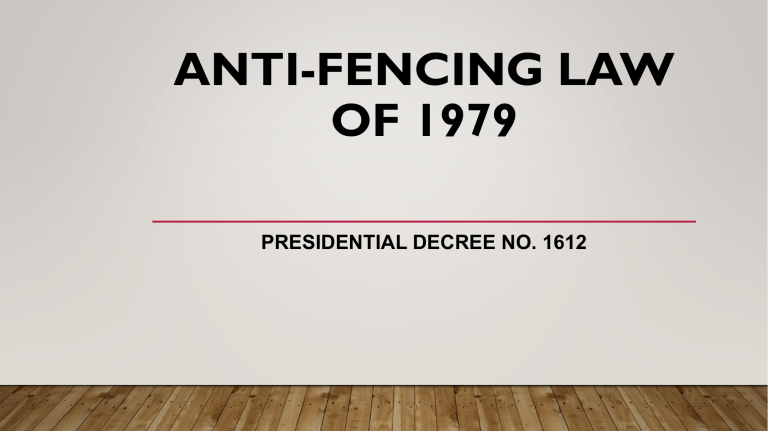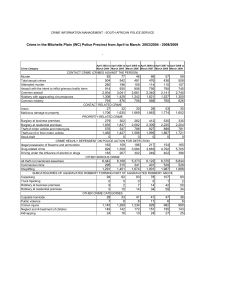
ANTI-FENCING LAW OF 1979 PRESIDENTIAL DECREE NO. 1612 WHAT IS FENCING? the act of any person who, with intent to gain for himself or for another, shall buy, receive, possess, keep, acquire, conceal, sell or dispose of, or shall buy and sell, or in any other manner deal in any article, item, object or anything of value which he knows, or should be known to him, to have been derived from the proceeds of the crime of robbery or theft. WHO IS A FENCE? includes any person, firm, association corporation or partnership or other organization who/which commits the act of fencing. ELEMENTS 1. The crime of robbery or theft has been committed 2. The accused who is not a principal or accomplice in the commission of the crime of robbery or theft, buys, receives ,possesses, keeps, acquires, conceals, sells or disposes, or buys and sells, or in any manner deals in any article, item, object or anything of value, which has been derived from the proceed of the said crime. 3.The accused knows or should have known that the said article, item, object or anything of value has been derived form the proceeds of the crime of robbery or theft. 4. There is, on the part of the accused, intent to gain for himself or another. PRESUMPTION OF FENCING Mere possession of any good, article, item, object, or anything of value which has been the subject of robbery or thievery shall be prima facie evidence of fencing. THE CRIME OF ROBBERY AND THEFT, ON THE OTHER HAND, AND FENCING , ON THE OTHER HAND, ARE SEPARATE AND DISTINCT OFFENSES Noting that there is rampant robbery and thievery of government and private properties and that robbery and thievery have become profitable on the part of the lawless elements because of the existence of ready buyers , commonly known as fence, of stolen properties, PD 1612 was enacted to impose heavy penalties on persons who profit by the effects of the crimes of robbery and theft. Evidently, the accessory in the crimes of robbery and theft could be prosecuted under the RPC or under PD 1612. However, in the latter case, he ceases to be a mere accessory but becomes a principal in the crime of fencing.


